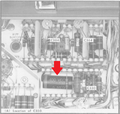549/Repairs: Difference between revisions
No edit summary |
No edit summary |
||
| Line 14: | Line 14: | ||
Tek_549_C335.png | Location of bad capacitor in horizontal amplifier | Tek_549_C335.png | Location of bad capacitor in horizontal amplifier | ||
</gallery> | </gallery> | ||
===Excessive brightness=== | |||
* Symptom: Excessive brightness, intensity control inoperable | |||
* Noted: R862 getting hot | |||
* Root cause: Cathode choke (L862) hairline fracture of magnet wire | |||
[[Category:Instrument repair reports]] | [[Category:Instrument repair reports]] | ||
Revision as of 06:34, 24 May 2021
C335
549 scopes from the Portland factory contain one black Aerovox 0.5 µF / 400 V capacitor in the horizontal amplifier (in the middle of the upper chassis) which is often deteriorated (leaky). When this is the case, the trace is compressed on the right side. To confirm, temporarily disconnect this capacitor and power on the scope with intensity control at CCW, and after initial warm-up of a minute increase the intensity to test if the problem disappears.
This capacitor is part of the beam steering arrangement during power-up to avoid screen burn. −150 V power on pulse is coupled via this capacitor to the R/C340 network in V343A's grid to move the beam to the left and off the screen during initial power up. The beam returns to screen after R/C340 discharges.
The leaky capacitor can be replaced with a modern 0.47 µF / 630 V (or higher) capacitor.
This problem does not appear to occur in Dutch-made 549s.
-
compressing trace on right side
-
Bad capacitor in horizontal amplifier schematic
-
Location of bad capacitor in horizontal amplifier
-
Location of bad capacitor in horizontal amplifier
Excessive brightness
- Symptom: Excessive brightness, intensity control inoperable
- Noted: R862 getting hot
- Root cause: Cathode choke (L862) hairline fracture of magnet wire



